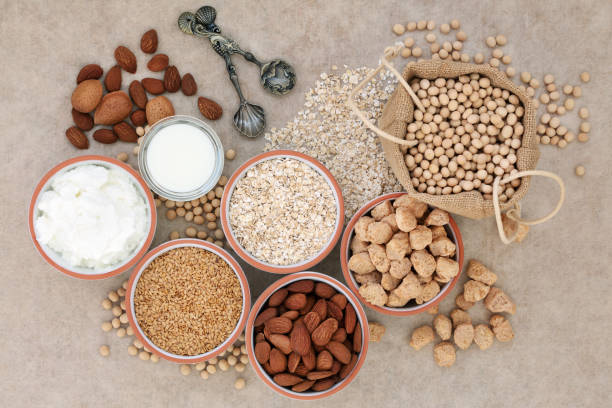Are you facing some issues regarding Bowel health? What are the advantages of dietary fibres in bowel health management?
Here is all information regarding Dietary Fibre in Bowel Health Management.

What are Dietary Fibres?
Dietary fibre is defined as that portion of food derived from plant cells, which is resistant to digestion by the elementary enzyme system in human beings.
It consists of Cellulose, Hemicellulose, lignins, pectins, waxes, gums, and Oligosaccharides.
The soluble fibres are indigestible and soluble in water. Insoluble fibres are indigestible but insoluble in water. Total fibre is the sum of insoluble and soluble fibres.
Total Fibres = Dietary Fibres + Functional Fibres
Some bacteria in the large intestine can degrade some components of the fibre releasing products that can be absorbed into the body and used as an energy source.
Resistant starch functions as dietary fibre. Legumes are the primary source of resistant starch with as much as 35%of legume starch escaping digestion.
You Can Also Read
Top 6; Health Advantages Of Dietary Fibres Supplementation.
An overview of Dietary Fibre/roughage.
Functional fibre is isolated and extracted from the synthetic fibre that has proven health benefits such as lower the risk of constipation, haemorrhoids, diverticular diseases, colorectal cancer, colon blockage, high blood glucose and high blood pressure.
Promote a healthy bowel, and healthy weight, and help in detoxification of the body.
Functions of Dietary Fibres in Bowel Health Management :
Chemically dietary fibre is non-nutrient carbohydrates (Polysaccharides) whose basic units are neutral sugars such as glucose, arabinose, mannose, xylose and galacturonic acid. Lignins are complex substances composed of phenolic derivatives.
Beneficial to Prevent Constipation:
Fibres prevent constipation by increasing faecal bulk. The movement of material through the colon is stimulated in part by the presence of residue in the lumen.
- Inulin present in the substance like onions increases stool frequency and has a mild bulking effect by increasing bacterial mass.
- Inulin prevents constipation. It acts as a prebiotic, when chronic insufficient bulk that is the characteristic of a low fibre diet occurs in the colon, the colon responds with stronger contractions to propel the smaller mass distally.
The chronically increased force leads to the creation of diverticula(which distorts the inner lining of the colon and may lead to colon cancer left untreated) which are herniations of the mucosal layer through weak regions in the colon musculature.
Adequate intake of dietary fibres may prevent the formulation of diverticula by providing bulk in the colon so that less forceful contractions are needed to propel it.
Helps to increase Faecal Volume and to promote a clean digestive system:
Microbial proliferation may promote increased faecal bulk. Faecal bulk consists of unfermented fibre, salts, and water as well as bacterial mass.
- Faecal bulk increases and fermentability decreases.
- It decreases Colon transit time.
- It decreases Intraluminal pressure.
- Intake of Dietary fibres helps to increase faecal bulk as fibre fermentability decreases.
Wheat bran is one of the most effective fibre laxatives because it can absorb three times its weight of water, thus producing a bulky stool.
processing and cooking reduce bulking effect due to physical disruption of the structure of the fibre.
Gastrointestinal responses of wheat bran and rice bran include as follows:
- Increased faecal bulk.
- Decreased intraluminal pressure.
- Greater frequency of defecation.
- Reduced intestinal transit time.
- Contributes to Soft Stools.
- Helps in Defecation Easier.
Beneficial to decreasing the risk of colon cancer:
Several mechanisms have been proposed to explain the protective action of dietary fibres against colon cancer.
- Fermentation of dietary fibre results in the production of short-chain fatty acids lowering the intestinal pH. This inhibits conversions of primary bile acids to secondary bile acids.
- Dietary fibre intake helps in proper colon microbial metabolism, which aids in fermentation in the colon and the production and nutrition of the short-chain fatty acids in the colon.
- The addition of bulk and water to the fair helps to dilute carcinogens to a non-toxic level.
- Fibre intake is beneficial to increasing faecal nitrogen and influencing mutagens and faecal enzymes in the colon.
Beneficial to decreasing Bowel Inflammatory Diseases(Ulcerative colitis, Crohn’s diseases):
The composition and health of colonic microflora affect the fermentation of carbohydrates; antibiotic treatments may alter colonic bacteria, reducing fermentation and causing diarrhoea, constipation, Piles etc.
It increases osmotic load from the presence of mucus, blood and protein from an inflamed gastrointestinal tract.
Dietary fibre intake helps to decrease the symptoms of patients who suffer from inflammatory bowel diseases.
Explore More Organic Healthy Food Products On “FOODVEZ”
Stay Healthy.
